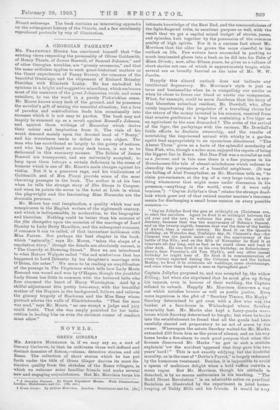A GEORGIAN PAGEANT.*
MR. FRANKFORT MOORE has convinced himself that "the existing views respecting the personality of Oliver Goldsmith, of Henry Tbrale, of James Boswell, of Samuel Johnson," and of other Georgian notables, are "grossly erroneous," and that the same criticism applies to such quasi-historical matters as the Court experiences of Fanny Burney, the romance of the beautiful Gunnings, and the elopement of Richard Brineley Sheridan with Elizabeth Linley. He has embodied his opinions in a bright and suggestive miscellany, which embraces most of the members of the great Johusonian circle, and some outsiders, to use the word in a purely Pickwickian sense. Mr. Moore knows every inch of the ground, and be possesses the novelist's gift of seizing the essential situation; but a love of paradox and contradiction leads him occasionally into excesses which it is not easy to pardon. The book may not inaptly be summed up as a revolt against Bostoell's Johnson, and against those writings of Macaulay which derive their colour and inspiration from it. The vials of his wrath descend mainly upon the devoted head of " Bozzy," and his truculence tends to defeat its own object. The man who has contributed so largely to the gaiety of nations, and who has lightened so many dark hours, is not to be dethroned in this summary manner. The foibles of James Boswell are transparent, and are universally accepted; to harp upon them betrays a certain deficiency in the sense of humour which is one of Mr. Moore's main charges against his victim. But it is a generous rage, and his vindication of Goldsmith and of Mrs. Piozzi provide some of the most charming passages in the book. The author is at his best when be tells the strange story of She Stoops to Conquer, and when he paints the scene in the hotel at Lisle in which the playwright and the fascinating Miss Hornecks are the dramatis personae.
Mr. Moore has real imagination, a quality which was not conspicuous in the English writers of the eighteenth century, and which is indispensable, in moderation, to the biographer and historian. Nothing could be better than his account of the fête champgtre upon the occasion of the marriage of Lord Stanley to Lady Betty Hamilton, and the subsequent romance, if romance it can be called, of that inconstant nobleman with Miss Farren. But perhaps the best chapter in the book, which "naturally," says Mr. Moore, "takes the shape of a regulation story," though the details are absolutely correct, is "The Comedy at Downing Street." Here we are introduced to what Horace Walpole called "the sad misforl tine that has happened to Lord Ilchester by his daughter's marriage with O'Brien, the actor." We seem to be reading an amplification of the passage in The Virginians which tells bow Lady Maria Esmond was wooed and won by O'Hagan, though the youthful Lady Susan has little in common with the battered belle who first charmed the heart of Harry Warriugton. And by a skilful adjustment this pretty love-story, with the beautiful mother of the Napiers in the background, follows and relieves the gloomy tragedy of Hackman and the Miss Reay whose portrait adorns the walls of Hinohinbrooke. "That the man was mad," says Mr. Moore, "no one except a judge and jury could doubt. That she was amply punished for her indis- cretion in leading him on even the strictest censor of conduct must allow."










































 Previous page
Previous page